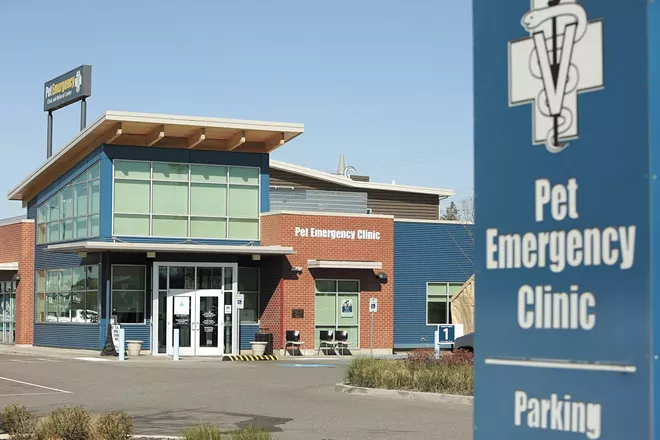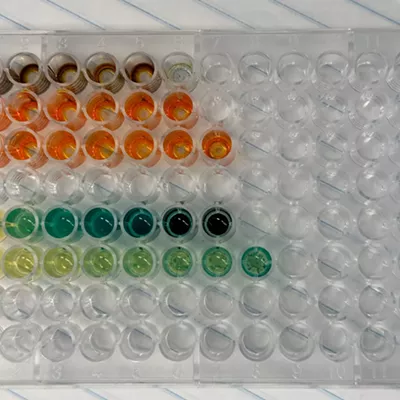
When Liz Rall's beloved 13-year-old dog, Maya, had an extremely bloated stomach and started throwing up foam in March, her veterinarian recommended taking the Labrador mix to Spokane's Pet Emergency Clinic.
Not only is PEC the only 24-hour emergency veterinarian hospital in town, it is one of the only places to get serious surgeries done. Often, they're the only place admitting last-minute patients.
Dogs can get an extremely serious and deadly condition known as bloat, where the stomach actually flips around inside the body, and with blood flow cut off, the animal can die suddenly if not treated.
So when Rall took her dog to the clinic and they asked if she wanted to make Maya's last moments comfortable or to try to save the dog's life, Rall told them she of course wanted to try to save her family's beloved animal.
Over the next three days, Maya had a litany of tests and treatment at the clinic: an ultrasound, radiographs, urinalysis, blood tests, IV fluids and several drugs were administered.
Rall says she was worried when she got a call informing her that Maya needed a catheter because she wasn't urinating.
"I said, 'That's weird, she knows the command to go potty,'" Rall says. "They said, 'Well, she's not going pee for us.' I said, 'I can come walk her' and they said, 'No, that's not necessary, we'll put a catheter in.'"
Rall says she and her husband worried about the dog, who had been treated for breast cancer in the past but had never had bathroom issues during that treatment. But three days later, they were told she was ready to go home.
Her stay racked up some serious costs: more than $3,100 at the Pet Emergency Clinic and another $1,000 for an outside ultrasound she had been referred for, Rall says.
The final diagnosis? Maya likely ate too much food, had acid reflux and needed time to digest.
By the time Rall got her back, the arthritic dog could barely move, had chewed a patch of fur off near her tail, and had ripped out one of her claws trying to get out of her kennel.
The cost and treatment didn't sit well with Rall. Though she notes that an outside vet who's never treated Maya told her the tests seemed reasonable, Rall says several other vets she'd called were upset to learn about the experience. But PEC remains the main option for short-notice emergencies: Rall tried to transfer Maya's care mid-stay, but no one could take her for several days.
When Rall researched more online, she learned that PEC, which already felt like the only choice, had actually been accused of working to ensure it's the only choice around.
"We were shocked at what we found," she says.
Two veterinarians who worked at PEC from the early 2000s until 2017 have sued their former employer in a federal antitrust case for unfair business practices.
The vets allege the emergency clinic has worked to create a monopoly in the area while working on a possible sale of the operation to National Veterinary Associates, a company that purchases vet clinics around the world. The merger was in the works when the vets first sued in state court in August 2018 and the deal was halted. It remains suspended, according to the current federal lawsuit filed in November 2020.
While NVA and PEC say the lawsuit is baseless, the vets, in their complaint, point to troubling consolidation of veterinary care around the country that can lead to fewer options for pet owners, drive away talented vets and decrease competition by design.
DENYING COMPETITION
About 44 years ago, veterinarians in the Spokane area partnered to open the Pet Emergency Clinic together so that their patients — everyone's pets — could have access to veterinary care after hours and on weekends without each clinic trying to handle emergencies on their own.About 50 Washington vets within a 50-mile radius are shareholders in the clinic, which in 2016 expanded into a new facility on Mission Avenue.
A December 2017 letter to shareholders from Linda Wood, then-president of the elected PEC Board of Directors (tasked with overseeing the business for shareholders) notes that the board became concerned when the clinic spent more money than it made for 12 of 19 months from early 2016 to late 2017. The letter was posted publicly on VIN (Veterinary Information Network) News Service, a news site that reports on issues affecting veterinarians.
In the letter, Wood lists concerns about the clinic, including that with fees increasing 3 percent every six months, "there are some fees that no longer seem reasonable." One vet told VIN News in 2019 they have had to euthanize pets because their clients couldn't afford care at PEC.
The board learned that their ER doctors were paid higher than the national average. PEC worked on contracts including salary cuts for staff and started negotiating with NVA to see if NVA might want to buy the business.
While emergency veterinarians Dru Choker and Matthew DeMarco were willing to take pay cuts, their attorney Mary Schultz says, they were not willing to sign the new contract in 2017 due to noncompete clauses included in the language. The contract demanded they agree not to open another emergency veterinary hospital if they ever left PEC.
"What happens with these things is in order to generate more profit, these companies will sometimes get rid of the high performers," Schultz says. "My clients understood that instinctively and knew that they could sign that agreement and get fired the next day."
So neither signed, and as a result, both were fired in November 2017.
But they weren't free yet. As they were still shareholders, PEC informed them they couldn't open a competing clinic within 25 miles, Schultz says. What's more, the two couldn't even sell their shares at the time because the company temporarily closed sales while negotiating with NVA.
So Choker, who had worked at PEC since 2002, and DeMarco, who had worked there since 2005, sued PEC and NVA in Spokane's Superior Court in August 2018 under Washington's anti-monopoly provisions.
After new information came to light during discovery for that case, it was clear there were grounds for a federal antitrust lawsuit, Schultz says. So they sued in federal court in November 2020, moving the state claims into the federal case.
As is typical for these types of cases, NVA and PEC asked the court to dismiss the case, claiming that there was no basis for it to move forward. But the court denied those requests, ruling last month that the case can go ahead and if the vets are able to prove their claims, they may be entitled to damages.
"The argument here is that National Veterinary Associates, in conjunction with the Pet Emergency Clinic, are working together to monopolize pet emergency care," Schultz says. "And they were making that effort by the use of noncompete provisions."
While NVA has not bought PEC, the two plaintiff veterinarians say in their lawsuit that the preliminary work being done to make a sale is what led PEC to insist that they sign the noncompete agreement.
Schultz says not only did PEC want its employees to agree not to compete, but they also planned to require that shareholders refer all patients to the clinic. Previously, that decision had been up to each vet.
"That's how you go from being the only one in town because of quality, to being the only one in town because nobody can refer anybody elsewhere," Schultz says. "It's gone from being the best place in town to evicting the best veterinarians."
Choker and DeMarco, who've since sold their shares, ended up getting licensed in Idaho and opening Emergency Veterinary Hospital in 2019 in Coeur d'Alene, where they now see pets outside the 25-mile noncompete radius they once faced.
NVA has purchased or partnered with more than 1,000 veterinary practices and emergency clinics in the U.S., Canada, New Zealand, Australia and Singapore, according to the company's website. The company takes over the paperwork and administrative side of the business, often continuing to employ the vets who sold their practice, or hiring new medical staff.
In April 2020, when NVA itself was being purchased by Compassion First, which buys specialty and emergency vet clinics, the Federal Trade Commission demanded the companies sell their clinics in three markets on the East Coast, because otherwise the merger would undermine competition and violate federal antitrust laws.
A spokeswoman for NVA declined to comment on the allegations in the Spokane case that their business practices could create a monopoly here, nor would she say whether it's standard for the company to require noncompete agreements when they buy clinics or hospitals.
The company's only statement to the Inlander is, "NVA believes the lawsuit is baseless and without merit."
Similarly, attorney Geoffrey Swindler, one of several representing PEC in the suit, declined to answer specific questions, but provided a statement.
"Pet Emergency Clinic has been providing local emergency veterinarian care in the Spokane area for over 40 years. PEC is owned by local Spokane veterinarians, who wanted a clinic where they could send their patients when their practices were closed," Swindler says. "PEC believes that the lawsuit brought against it by two former employees/owners is baseless and without merit."
But Schultz says the court's March ruling allowing the case to move forward literally proves the case is not meritless.
"That has already been shown to be wrong," Schultz says. "They already lost on that claim."
Schultz says a major concern is that in the end, there won't be options for pet owners.
"Ultimately what can happen is the quality of the services previously provided have been lessened, but there's no place else to go," Schultz says. "The prices go up, quality goes down, and you're stuck with it. Those are the dangers of monopolies." ♦
























